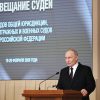
More areas of England could be put under tier 4 restrictions from Boxing Day while a mass coronavirus testing programme was due to get under way to alleviate congestion at the border between France and the UK.
Reports suggested ministers would meet on Wednesday to decide whether more of the country would be put under the toughest restrictions amid fears over the spread of a new mutant strain of coronavirus.
It came as France lifted its travel ban and allowed journeys from the UK to resume, but said those seeking to travel must have a negative coronavirus test result.
The Daily Telegraph reported that local leaders and health officials in Birmingham met on Tuesday night to discuss the possibility of the Midlands city being moved into tier 4, while areas in lower tiers could be moved up to tier 3.
Here’s what we know about the new variant of coronavirus | Sharon Peacock
Read more
Genomic researchers have found the new variant, which is said to be 70% more infectious than previous strains, has already spread around the UK, with cases identified in Wales and Scotland.
Health chiefs in Cumbria have said the new variant is in the county and could be behind a sharp increase in the number of new cases, while Lancashire’s director of public health said there was a “high likelihood” the new variant was in the county.
Quick guide Covid at Christmas: how do rules vary across Europe?
Show
Hide
France reopened non-essential shops this month, allowing Christmas shopping to begin. But an uptick in new infections since then means that while travel is permitted from 15 December, a nationwide 8pm to 7am curfew will begin then that will be lifted for 24 December, but not Christmas Day or New Year’s Eve. Bars and restaurants will not reopen until January and private gatherings are limited to six adults.
Germany‘s «lockdown light», with bars and restaurants closed since November, has not proved effective and the country has shut down further, closing all bar essential shops (such as supermarkets and pharmacies) as well as hair and beauty salons until at least 10 January. A maximum of five people from two households may meet, except for 24, 25 and 26 December when up to four close family members from other households can be invited.
Austria’s strict lockdown has ended and the country is carrying out a mass programme of 10 million tests over the next fortnight with the aim of allowing more families to reunite over the festive period. Christmas markets have been cancelled.
Italy‘s prime minister has said tougher restrictions will be needed over the holiday period,but they have not yet been announced. Inter-regional travel is already banned from 20 December to 6 January except for work, health or emergency reasons, and Italians may not leave their home towns on Christmas Day, Boxing Day or New Year’s Day. Midnight mass on 24 December has been brought forward so worshippers can get home before a nationwide 10pm-5am curfew.
Spain has appealed for people to be responsible but will allow movement between regions “for family reasons” between 23 December and 6 January. Regional curfews, which range from 10pm to midnight, will be pushed back to 1.30am on 24 and 31 December, when the limit for gatherings will be raised from six to 10, a measure that will also apply on Christmas Day and New Year’s Day.
The Netherlands has imposed a tough Christmas lockdown, closing non-essential shops and businesses, gyms, museums, cinemas and theatres for five weeks until 19 January. Bars and restaurants have been closed since mid-October. Schools are switching to online learning and people advised to stay at home. Households may invite up to two guests a day except for 24-26 December, when the ceiling is raised to three, excluding children under 13.
Belgium has said households may be in close contact with just one extra person over the Christmas period, although people living on their own will be allowed to meet two others. Fireworks are to be banned on New Year’s Eve to limit gatherings.
Poland will allow people to spend Christmas only with their immediate family, with no more than five guests to be invited to each household until at least 27 December and travel banned outside people’s home towns.
Britain is relaxing restrictions over the holiday with “Christmas bubbles” allowing up to three households to mix between 23 and 27 December. Scientists, government advisers and medical experts have called for an urgent rethink, suggesting the move could result in a disastrous third wave in the New Year.
Jon Henley Europe correspondent
Was this helpful?
Thank you for your feedback.
The Labour leader, Sir Keir Starmer, has written to the prime minister to say his party would back any government moves to tighten restrictions if that is what scientists recommended.
Sinn Féin has said an island-wide travel shutout should be introduced in Ireland to stem the spread of the new variant there.
Meanwhile, it is expected NHS test and trace staff and the military will be deployed for the mass testing programme in Kent, where more than 2,800 HGVs were stuck on Tuesday afternoon.
France said a negative test result taken less than 72 hours before the journey would be required for those entering the country from the UK.
The transport secretary, Grant Shapps, said rapid lateral flow tests – which can give results in about 30 minutes – will be used in the testing programme, while the French authorities will be carrying out similar testing on hauliers entering the UK.
Full details of the testing programme have not yet been released, but Shapps warned it could take until Christmas for congestion to be relieved near ports.
He said: “We have managed to get all those tests to Kent, enough for all the vehicles which will want to return before Christmas, so that won’t be an issue. Obviously there’s a physical issue of providing the test, getting the results. A negative test allows you to leave.
“But all of that requires operationalising and that can’t happen in an instant, so this will take two or three days for things to be cleared.”
He urged hauliers not to travel to Kent until further notice.
UK coronavirus cases
The Road Haulage Association (RHA) warned UK supply chains would be affected despite the mass testing programme being introduced. An RHA spokesman said: “Even if the border is opened up, a short delay in the process is going to mean huge delays in the supply chain.”
Elizabeth de Jong, policy director at the business group Logistics UK, said it was “vital” that testing procedures were “stood up fast to ensure drivers can be processed and get home for Christmas safely”. She added: “The backlog of traffic across the region will take time to clear so hauliers should wait for further news before travelling to Kent.”
The protocol agreed with the French government will be reviewed on 31 December – but could run until 6 January, the Department for Transport (DfT) said.
Those who can make journeys include French and EU residents, British or third-party nationals who normally live in France or the EU, as well as some other groups.
The transport secretary also announced the temporary relaxation of drivers’ hours for hauliers to help them get through UK borders safely over the coming weeks.
The Netherlands has lifted its travel restrictions on passengers from the UK, provided they return a negative test result within 72 hours of departure.
Scotland’s first minister, Nicola Sturgeon, said perishable produce such as seafood must be prioritised if hauliers start moving freight across the Channel again on Wednesday.
She tweeted: “We still await detail of the agreement, but if freight starts moving tomorrow – as we must hope it will – the plan to prioritise perishable produce such as seafood should be activated immediately.”




















































Свежие комментарии